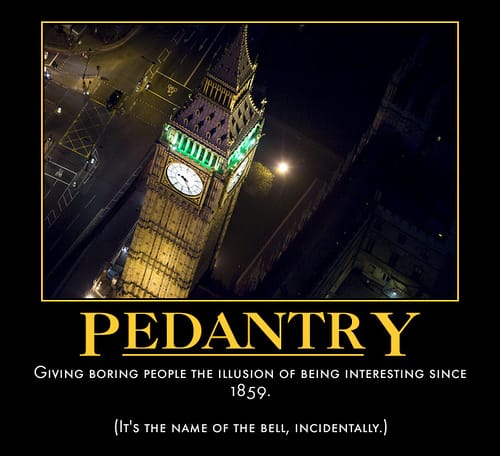Friday, May 31, 2013
Tuesday, May 21, 2013
Senior project progress
I'd say I'm doing pretty well on the progress of my senior project. I mean I do wish I had some more songs than I have right now, but there are some days when I have nothing in my mind and then there are other days when I have lots of ideas and lyrics running through my brain. I do have 3 songs so far for my album. I'm going to try and go for about 10. Well here's a sneak peak of one song I just wrote to my best friends.
"Our Own Song"
It always comes out so typical
"Friends forever" sounds so dull
There's cards and songs full of words
All of which we've always heard
There's really simplicity in the fact
Most of which words can lack
So I'll try and keep it simple and let it be
I'll do my best to truly make you see
How you're the anchor to my boat
I'm your gloves and you're my coat
You're the brilliant shine to my ruby
I'm your Shaggy and you're my Scooby
So Oh how how can not see
You have helped shape this person within me
Those times when we would cry
Or laugh till we'd die
Who will be there to tell let me know
That they'll be there through my highs and my lows?
And promise me no matter the miles
You will be there through all my trials
Repeat chorus
Don't go singin' all those songs
Or saying things that don't belong
Just keep it easy
Keep it breezy
Because a friendship like ours is our own little song
Thursday, April 25, 2013
Groupthink
Well I'm not necessarily in a complete group. It's more like I'm doing 3 poems and one other person is doing one with me while another person is doing 2 with me. So I'm doing one by myself. One person did their gridlock for one of them so we discussed a lot on the connotation of The Tide Rises the Tide falls because we were all a little confused over that one.
Gridlock- A Dream Within a Dream by Edgar Allan Poe
|
Title
(of poem
means)
|
If what we think is real is a dream and what is a dream is actually real. |
|
Paraphrase
(parts of the
poem)
|
"And I hold within my hand Grains of the golden sand- How few! yet how they creep Through my fingers to the deep, While I weep- while I weep! O God! can I not grasp Them with a tighter clasp? O God! can I not save One from the pitiless wave?" He is describing how few grains of sand there are in his hand yet it seems like there is an endless amount of them and he cannot hold every single one. |
|
Connotation
(of some of the words –
changing literal meaning to implied or associated values)
|
"O God! can I not save one from the pitiless wave?" He means not literally "save" the grains of sand from a wave. He means can he hold every single grain of sand before the water washes it away. |
|
Attitude
(What is the attitude of the
author, characters or yourself?)
|
The attitude is pondering and questioning. |
|
Shift
(At first we think or feel one
way – then there is a shift: identify the shifts and explain
them)
|
The big shift is between the two stanzas. The first is describing the sweetness of being in a dream within a dream while the second is describing the horror and frustration the author seems to have trying to tell what is real or not. |
|
Title Revisited
(Any new insights on meaning or
significance of title?)
|
It's hard to tell a dream from reality. |
|
Theme
|
No matter how hard we try to hold on to something or someone we love, they eventually start slipping through our fingers. |
Gridlock- The Road Not Taken by Robert Frost
|
Titleof poem means
|
Literally means....a road not taken before. Probably a road that has leaves and
branches all on it, no foot prints or anything
|
|
Paraphraseparts of the Poem
|
"And sorry I could not travel both, And be one traveler, long I stood" Means
that the traveler wishes he could take both paths but he is only one person so
he has to choose which one he wants to take.
|
|
Connotationof some of the words – changing literal meaning to implied
or associated values
|
|
|
AttitudeWhat is the attitude of the author, characters or
yourself?
|
The character, the traveler, seems confused as well as adventurous. I also felt
confused at first but then optomistic.
The whole decision making issue is confusing to people. It's hard to make decisions. |
|
ShiftAt first we think or feel one way – then there is a shift:
identify the shifts and explain them
|
"And both that morning equally lay
In leaves no step had trodden black. Oh, I marked the first for another day! Yet knowing how way leads on to way I doubted if I should ever come back. I shall be telling this with a sigh Somewhere ages and ages hence: Two roads diverged in a wood, and I, I took the one less traveled by, And that has made all the difference." There's the shift...in the beginning the traveler describes how the one of the paths looks "safe" and how one looks "less traveled" making it seem like he would obviously take the "safe" one. BUT! He decides to take it another day and follow the one "less traveled". He took a risk and it "made all the difference." |
|
Title
revisitedAny new insights on meaning
or significance of title?
|
The title basically describes taking risks. Taking a road for instance that you
have never traveled. Be adventurous!
|
|
Theme Sometimes it's nice to make risky decisions and be adventurous. You never know
where they might lead.
|
Gridlock- The Tide Rises the Tide Falls by Longfellow
Titleof poem means
|
The tide comes then the tide goes away again
|
Paraphraseparts of the Poem
|
As the tide is rising and falling, the sun is going down and the beach-goer
leaves the beach. It's night time and it's dark. The sea wipes away the
footprints from the day. The sun comes back up and everything awakens but the
traveller doesn't return to the beach. All the while, the tide is rising and
falling.
|
Connotationof some of the words – changing literal meaning to implied
or associated values
|
The ocean is a metaphor for the sun
rising and setting and time going on. Te repitition of the title proves that.
The waves are setting everything back to new, signifying a new day
|
AttitudeWhat is the attitude of the author, characters or
yourself?
|
The author is
melancholy. He is admiring of the sea's ability to be unknowing of time or
events.
|
ShiftAt first we think or feel one way – then there is a shift:
identify the shifts and explain them
|
The shift is after the second stanza and before the third. We go from nighttime
and peaceful to daylight and awakenings.
|
Title
revisitedAny new insights on meaning
or significance of title?
|
The title signifies the continuity of the tide rising and the tide falling.
|
ThemeLife goes on.
|
Tuesday, April 23, 2013
Seventh Reading
I picked the poem The Tide Rises the Tide Falls by Longfellow to repeat seven times. It was interesting because we sang this in choir about two years ago so I already knew the poem. I did have to look a few times at the words because I had forgotten some, but eventually I got the rise and fall of the poem. After about the fourth time I felt like I got it down. Before I did this excerise I went into it already knowing and loving this poem. It made this a whole lot easier to repeat over and over again. And I'm still not sick of it! After every single time I thought about the poem as a whole as well as individual lines. I, as the blog said, meditated on it. The poem is so soothing to the ears that I loved repeating it seven times.
Sunday, April 21, 2013
Lit. Circles Multiple Choice Answers
Slaughterhouse 5:
1.D 21.A 41.A
2.C 22.B 42.D
3.D 23.C 43.A
4.A 24. B 44.B
5.B 25.C 45.D
6.C 26.D 46.C
7.A 27.D 47.C
8.D 28.B 48. B
9.D 29.D 49.A
10.C 30.A 50.A
11.D 31.A
12.A 32.B
13.A 33.C
14.B 34.C
15.D 35.D
16.A 36.A
17.A 37.B
18.C 38.D
19.D 39.C
20.C 40.D
Life of Pi
1.C
2.A
3.C
4.E
5.C
6.B
1.D 21.A 41.A
2.C 22.B 42.D
3.D 23.C 43.A
4.A 24. B 44.B
5.B 25.C 45.D
6.C 26.D 46.C
7.A 27.D 47.C
8.D 28.B 48. B
9.D 29.D 49.A
10.C 30.A 50.A
11.D 31.A
12.A 32.B
13.A 33.C
14.B 34.C
15.D 35.D
16.A 36.A
17.A 37.B
18.C 38.D
19.D 39.C
20.C 40.D
Life of Pi
1.C
2.A
3.C
4.E
5.C
6.B
Tuesday, April 9, 2013
1987 AP English Literature Multiple Choice Answers
1. C
2. A
3. C
4. E
5. D
6. D
7.E
8.B
9.E
10.C
11. D
12. B
13.B
14. C
15. A
16.B
17.C
18. E
19. A
20. C
21. E
22. E
23.B
24. A
25.A
26.C
27.E
28.D
29.A
30. B
31.D
32.B
33. D
34. A
35. E
36. E
37. B
38.D
39.C
40.C
41.B
42.A
43.B
44.E
45.A
46.B
47.B
48.A
49.C
50.D
51.C
52. C
53.B
54.A
55.B
56.C
57.D
58.E
59.B
60.A
2. A
3. C
4. E
5. D
6. D
7.E
8.B
9.E
10.C
11. D
12. B
13.B
14. C
15. A
16.B
17.C
18. E
19. A
20. C
21. E
22. E
23.B
24. A
25.A
26.C
27.E
28.D
29.A
30. B
31.D
32.B
33. D
34. A
35. E
36. E
37. B
38.D
39.C
40.C
41.B
42.A
43.B
44.E
45.A
46.B
47.B
48.A
49.C
50.D
51.C
52. C
53.B
54.A
55.B
56.C
57.D
58.E
59.B
60.A
Monday, February 25, 2013
Lit Terms Remixed 31-End
31. Dialect: the language of a particular district, class, or group of persons; the sounds, grammar, and diction employed by people distinguished from others
http://www.youtube.com/watch?v=l9oIvsk7cvw&feature=player_detailpage
32. Dialectics: formal debates usually over the nature of truth
http://www.youtube.com/watch?feature=player_detailpage&v=t1Lo3P-Dp4Y
33. Dichotomy: split or break between two opposing things
34. Diction: the style of speaking or writing as reflected in the choice and use of words
http://www.youtube.com/watch?v=bhR1nJ1oY9M&feature=player_detailpage
35. Didactic: having to do with the transmission of information; education
36. Dogmatic: rigid in beliefs and principles
37. Elegy: a mournful, melancholy poem, especially a funeral song or lament for the dead, sometimes contains general reflections on death, often with a rural or pastoral setting.
http://www.youtube.com/watch?v=Ov4I4k3vV3M
Epic: a long narrative poem unified by a hero who reflects
the customs, mores, and aspirations of his nation of race as he makes his way
through legendary and historic exploits, usually over a long period of time
(definition bordering on circumlocution).
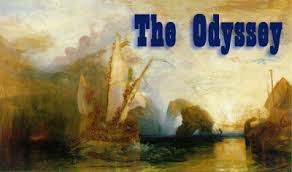
Epigram: witty aphorism.
Epitaph: any brief inscription in prose or verse on a tombstone; a short formal poem of commemoration often a credo written by the person who wishes it to be on his tombstone.
Epithet: a short, descriptive name or phrase that may insult someone’s character,
characteristics

Euphemism: the use of an indirect, mild or vague word or
expression for one thought to be coarse, offensive, or blunt.
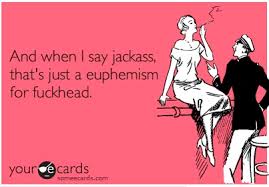
Evocative (evocation): a calling forth of memories and
sensations; the suggestion or production through artistry and imagination of a
sense of reality.Exposition: beginning of a story that sets forth facts, ideas, and/or characters, in a detailed explanation.
Expressionism: movement in art, literature, and music
consisting of unrealistic
representation of an inner idea or feeling(s).
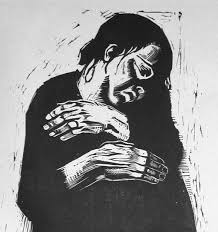
Fallacy: from Latin word “to deceive”, a false or misleading
notion, belief, or argument; any kind of erroneous reasoning that makes
arguments unsound.
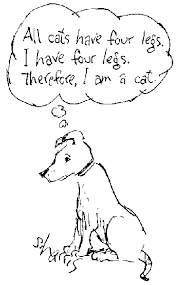
Falling Action: part of the narrative or drama after the
climax.

Figurative Language: apt and imaginative language
characterized by figures of speech (such as metaphor and simile).
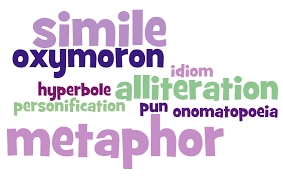
Folk Tale: story passed on by word of mouth.
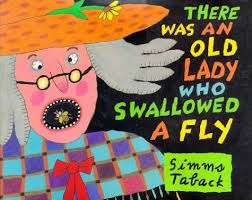
Free Verse: verse without conventional metrical pattern,
with irregular pattern or no rhyme.
 http://www.youtube.com/watch?v=sHE0wmgljco
http://www.youtube.com/watch?v=sHE0wmgljco
 http://www.youtube.com/watch?v=sHE0wmgljco
http://www.youtube.com/watch?v=sHE0wmgljco
Genre: a category or class of artistic endeavor having a
particular form, technique, or content.

Gothic Tale: a style in literature characterized by gloomy
settings, violent or grotesque action, and a mood of decay, degeneration, and
decadence.

Hyperbole: an exaggerated statement often used as a figure
of speech or to prove a point.

Implication: a meaning or understanding that is to be arrive
at by the reader but that is not fully and explicitly stated by the author.

Incongruity: the deliberate joining of opposites or of
elements that are not appropriate to each other.

Inference: a judgement or conclusion based on evidence
presented; the forming of an opinion which possesses some degree of probability
according to facts already available.

Irony: a contrast or incongruity between what is said and
what is meant, or what is expected to happen and what actually happens, or what
is thought to be happening and what is actually happening.
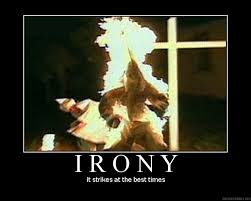
Interior Monologue: a form of writing which represents the
inner thoughts of a character; the recording of the internal, emotional
experience(s) of an individual; generally the reader is given the impression of
overhearing the interior monologue.

Inversion: words out of order for emphasis.

Juxtaposition: the intentional placement of a word, phrase,
sentences of paragraph to contrast with another nearby.

Lyric: a poem having musical form and quality; a short
outburst of the author’s innermost thoughts and feelings.

Magic(al) Realism: a
genre developed in Latin America which juxtaposes the everyday with the marvelous or magical.
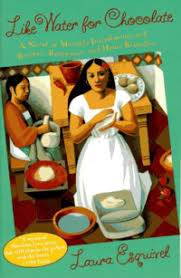
Metaphor(extended, controlling, and mixed): an analogy that
compare two different things imaginatively.

Extended: a metaphor that is extended or developed as far as
the writer wants to take it.

Controlling: a metaphor that runs throughout the piece of
work.

Mixed: a metaphor that ineffectively blends two or more
analogies.

Metonymy: literally
“name changing” a device of figurative language in which the name of an
attribute or associated thing is substituted for the usual name of a thing.
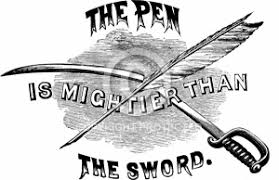
Mode of Discourse:
argument (persuasion), narration, description, and exposition.
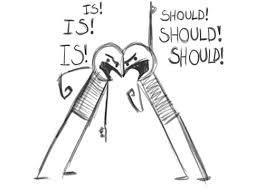
Modernism: literary
movement characterized by stylistic experimentation, rejection of tradition,
interest in symbolism and psychology

Monologue: an
extended speech by a character in a play, short story, novel, or narrative
poem.
 http://www.youtube.com/watch?v=-JD6gOrARk4
http://www.youtube.com/watch?v=-JD6gOrARk4
 http://www.youtube.com/watch?v=-JD6gOrARk4
http://www.youtube.com/watch?v=-JD6gOrARk4
Mood: the
predominating atmosphere evoked by a literary piece.

Myth: a story, often about immortals, and sometimes connected with religious rituals, that attempts to give meaning to the mysteries of the world.
Narrative: a story or
description of events.

Omniscient Point of View:
knowing all things, usually the third person.

Oxymoron: a figure of speech in which two contradicting
words or phrases are combined to produce a rhetorical effect by means of a
concise paradox.
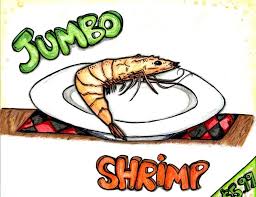
Pacing: rate of
movement; tempo.
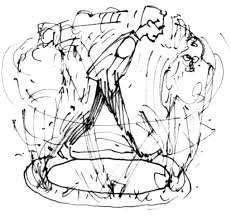
Paradox: a statement
apparently self-contradictory or absurd but really containing a possible truth;
an opinion contrary to generally accepted ideas.

Parallelism: the principle in sentence structure that states
elements of equal function should have equal form.

Parody: an imitation
of mimicking of a composition or of the style of a well-known artist.
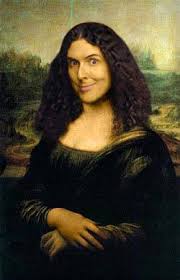
Personification: a figure of speech attributing human qualities to inanimate objects or abstract ideas.
Point of View: the attitude unifying any oral or written
argumentation; in description, the physical point from which the observer views
what he is describing.
Postmodernism: literature characterized by experimentation, irony, nontraditional forms, multiple meanings, playfulness and a blurred boundary between real and imaginary.
Protagonist: the central character in a work of fiction; opposes antagonist.
Realism: writing about the ordinary aspects of life in a straightfoward manner to reflect life as it actually is.
Requiem: any chant,
dirge, hymn, or musical service for the dead.

Rhetoric: use of language, both written and verbal in order to persuade.
Rhetorical Question: question suggesting its own answer or
not requiring an answer; used in argument or persuasion.

Rising Action: plot build up, caused by conflict and
complications, advancement towards climax.

Romanticism: movement
in western culture beginning in the eighteenth and peaking in the nineteenth
century as a revolt against Classicism; imagination was valued over reason and
fact.
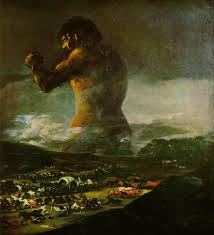
Spiritual: a folk song, usually on a religious theme.
http://www.youtube.com/watch?v=QviNqBgArks ("Deep River" Song, spiritual)
Speaker: a narrator, the one speaking.

Stream of Consciousness: the style of writing that attempts
to imitate the natural flow of a character’s thoughts, feelings, reflections,
memories, and mental images, as the character experiences them.
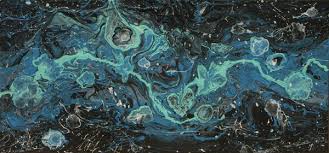
Subordination: the couching of less important ideas in less
important structures of language.
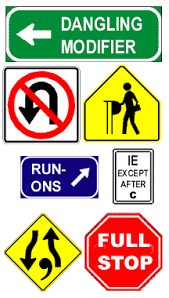
Symbol: something which stands for something else, yet has a
meaning of its own.

Synecdoche: another form of name changing, in which a part
stands for the whole.

Subscribe to:
Posts (Atom)
